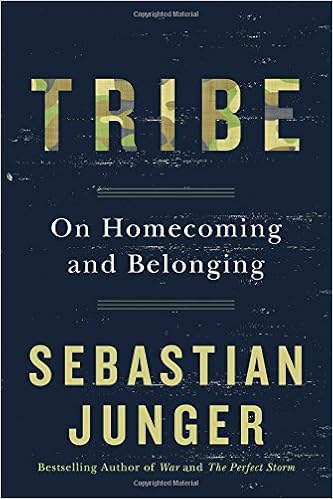Book Review: Tribe: On Homecoming and Belonging by Sebastian Junger
Goodsreads Description: There are ancient tribal human behaviors-loyalty, inter-reliance, cooperation-that flare up in communities during times of turmoil and suffering. These are the very same behaviors that typify good soldiering and foster a sense of belonging among troops, whether they’re fighting on the front lines or engaged in non-combat activities away from the action. Drawing from history, psychology, and anthropology, bestselling author Sebastian Junger shows us just how at odds the structure of modern society is with our tribal instincts, arguing that the difficulties many veterans face upon returning home from war do not stem entirely from the trauma they’ve suffered, but also from the individualist societies they must reintegrate into.
A 2011 study by the Canadian Forces and Statistics Canada reveals that 78 percent of military suicides from 1972 to the end of 2006 involved veterans. Though these numbers present an implicit call to action, the government is only just taking steps now to address the problems veterans face when they return home. But can the government ever truly eliminate the challenges faced by returning veterans? Or is the problem deeper, woven into the very fabric of our modern existence? Perhaps our circumstances are not so bleak, and simply understanding that beneath our modern guises we all belong to one tribe or another would help us face not just the problems of our nation but of our individual lives as well.
My Review: Humans are more than pack animals; we're a community animal. In every facet of life, we rely on one another to not only survive, but grow and flourish. Yet somewhere along the evolutionary track we've been derailed, and now we find ourselves in a modern society with all the components of a utopia-- yet which is hurtling itself faster and faster towards dystopia. Sebastian Junger's Tribe takes a critical look at individualism in our modern society and how it conflicts with our tribal nature.
During natural disasters, wars, and any breakdowns of civilization, Junger notes the emergence of primal tribal behaviours that are proven to improve mental health, reduce violent crimes, and curb crime against the collective such as fraud. Junger has spent many years as a journalist working on front lines from many different conflicts across the world. He looks at tribal society vs 'civilized' society through a historical as well as anthropological lens that makes this book not only informative but fascinating.
The author's background in military has a palpable influence on the book. The book has a particular focus on PTSD in veterans, and comparing our modern soldiers to warriors passed. He argues that tribal societies were more effective at reintegrating warriors back into society after conflicts, thus why PTSD was not common in soldiers until modern times. The arguments were incredibly well-researched and supported, though most of the sources were cited in an appendix as opposed to in text, which some readers have said made it difficult to discern between fact and opinion. I found this method to be less disruptive and created a more seamless read for readers who may be intimidated by a textbook-like format.
The focus in the book was particularly on wartime mentality, natural disaster responses, and the evolutionary support for tribal lifestyle, which was slightly limiting. From my own research into Native American culture, there is much more evidence for how tribal communities provide for people's spiritual, emotional, and social needs outside of conflict scenarios that wasn't even mentioned. In the prologue, Junger touches on a point that seems pivotal to the success of tribal society and yet was glossed over throughout the rest of the book. In discussing an experience he had backpacking, he states, "He'd been generous, yes, but lots of people are generous; what made him different was the fact that he'd taken responsibility for me." A centerpiece of tribal society--or any sort of successful community-- is not just caring for one another, but taking responsibility for one another--to ensure health and happiness, to protect from harm, to support, and to provide purpose and mastery. This shows through all the examples that Junger provides--from the survivors of the siege of Sarajevo to miners responding to a mine collapse-- that the responsibility that each member takes upon himself to ensure the well-being of the group is what creates that tribal environment. But the book itself doesn't look into how this sense of responsibility contributes to this communal environment, instead only focusing on examples of people banding together against a threat.
The book begins with historical events and evidence from colonists' contact with Native American tribes. There is a fair bit of information conveyed in the opening pages, which may put some readers off or feel draggy. But the book quickly picks up and achieves a better balance between historical and anthropological evidence, as well as personal experience and current studies and statistics. The writing is easy to digest and flows well, aside from the boggy beginning. As someone working in mental health, I found the book especially interesting in how it related community to the process of healing, which is something supported in the practices employed where I work. It helps to bring some pieces together and suggests that the way to healing our society may lie in our tribal roots.
TL;DR: 4/5 stars. An interesting look at the social, emotional, and mental benefits of tribal society with a focus on PTSD in veterans.





No comments:
Post a Comment